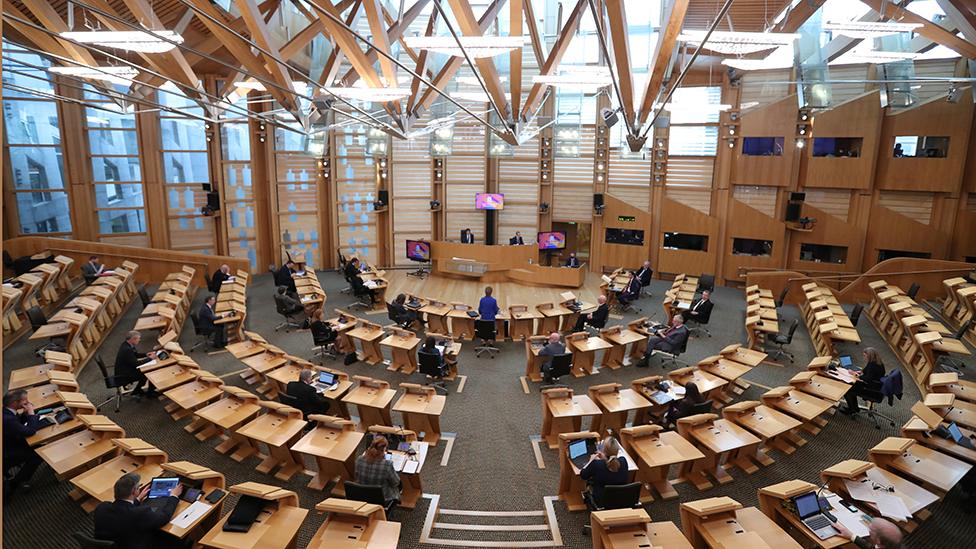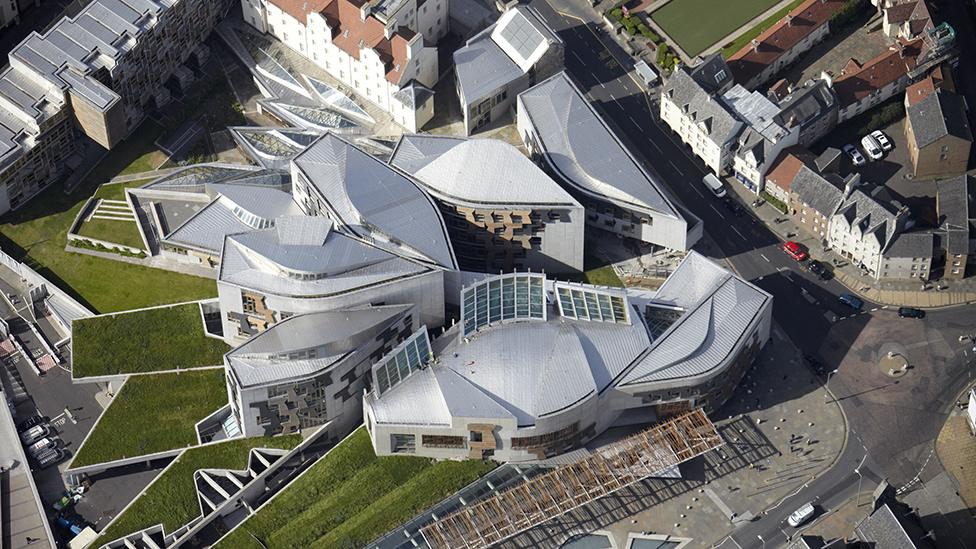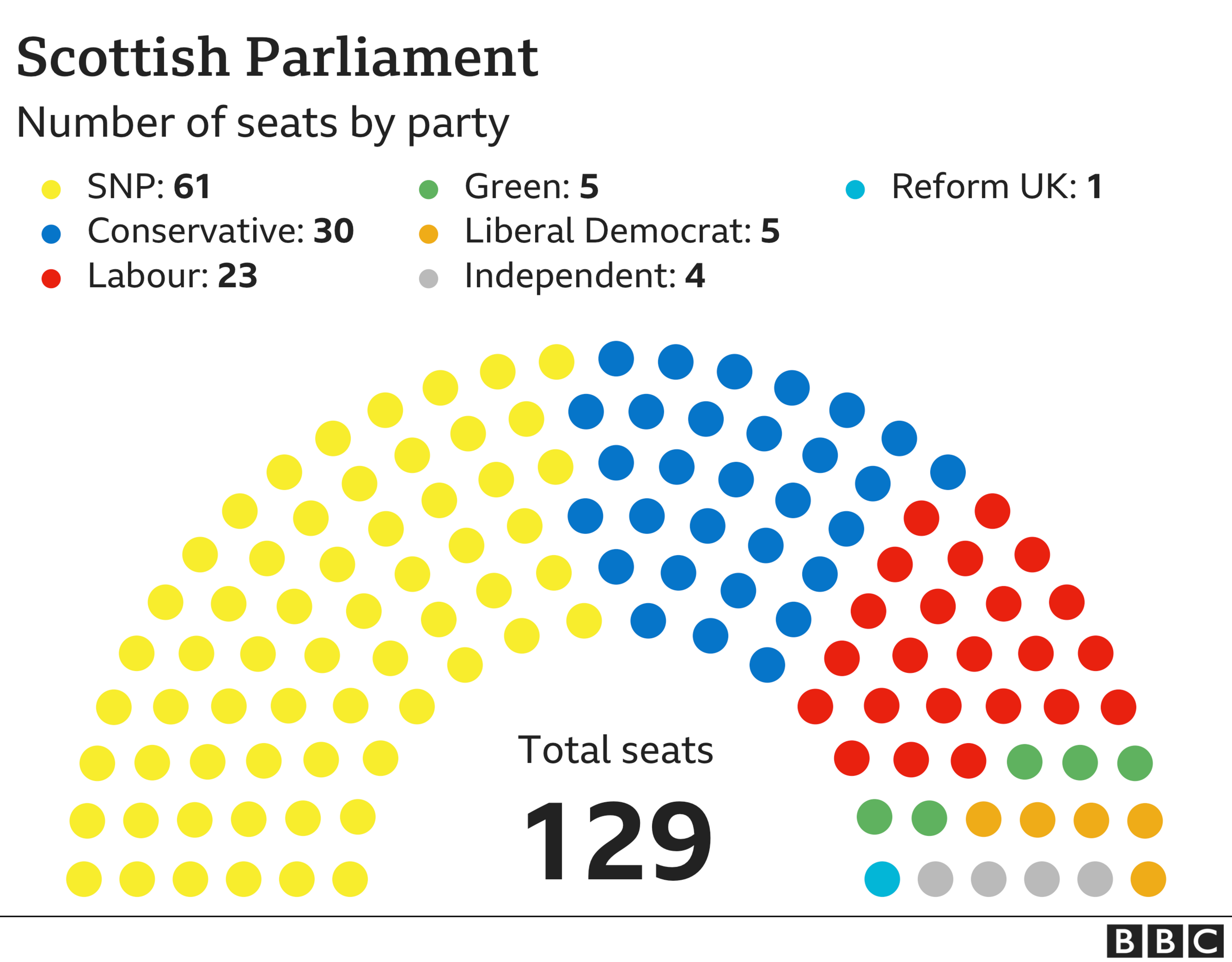Scottish election 2021: A really simple guide
- Published

The electorate have now cast their votes to elect members of the Scottish Parliament (MSPs).
The poll is now held every five years, and this will be the sixth election in its history.
What does the Scottish Parliament do?
It was established in 1999 to debate issues and make laws for Scotland.
A total of 129 MSPs are elected to the Parliament - often referred to as Holyrood, after the area of Edinburgh where the parliament building stands.
They debate and pass laws on devolved issues - these include most aspects of day-to-day life in Scotland, such as education, health and transport.

SCOTLAND ALERTS: Get extra updates on BBC election coverage

Holyrood also has control over some taxes, most notably income tax, and some areas of the welfare system.
The UK Parliament at Westminster can pass laws on reserved matters, which are generally those with a UK-wide or international impact - such as defence, foreign policy and immigration.

Aerial view of the Scottish parliament building in Edinburgh
Who can vote in the election?
Anyone who lives in Scotland and is registered to vote is eligible, so long as they are aged 16 or over on the day of the election and have not been legally excluded from voting (for example because they are serving a prison sentence of longer than 12 months).
They must also be a British or Irish citizen or a citizen of another country living in Scotland who has permission to enter or stay in the UK, or who does not need permission.
How does voting work?
People have two votes - one for a constituency MSP, and another for a regional ballot.
There are 73 Constituency MSPs, each elected on a first-past-the-post system similar to the UK general election - the winner is the candidate who receives the most votes in each constituency.
In the regional ballot, people vote for a party. The parties are then allocated a number of MSPs depending on how many votes they receive - once the number of constituencies already won in that region is taken into account - to make the overall result more proportional.
There are eight electoral regions, each with seven regional MSPs. These are:
Central Scotland
Glasgow
Highlands and Islands
Lothian
Mid-Scotland and Fife
North east Scotland
South Scotland
West Scotland
This means that people in Scotland are each represented by eight MSPs - one representing their constituency and the other seven representing their region.
The Scottish government is formed from the party that hold the most seats in the parliament, or alternatively a coalition of more than one party.
It is led by the first minister, who appoints a number of ministers to be in charge of departments such as education, health and finance.
Election 2021: How does Scotland's voting system work?
When will we know the results?
In previous elections, votes were counted as soon as the polls closed at 22:00, with the results being announced overnight.
The pandemic means that the votes in this election will not start to be counted until the morning after, with a final result not expected until the weekend of 8/9 May.
What happened last time?
The SNP, led by First Minister Nicola Sturgeon, lost its overall majority in the 2016 election, but continued in power after forming a minority government.
The Scottish Conservatives - led by Ruth Davidson - finished second after overtaking Scottish Labour for the first time, while the Scottish Greens were fourth - ahead of the Scottish Liberal Democrats.
The SNP has won every Scottish Parliament election since 2007.

What are the big issues for voters?
The election campaign is likely to be dominated by the question of whether there should be another referendum on Scottish independence.
The SNP has already said it wants to hold a vote once the Covid pandemic ends - if the election returns another pro-independence majority.
The Scottish Greens also back independence, but the Scottish Conservatives, Labour and Liberal Democrats are all opposed and say the country's focus should be on recovering from the pandemic rather than the constitution.
Health, education, the environment and the economy are among the other important issues for voters, and all are likely to feature prominently during the campaign.
What impact will Covid-19 have on the campaign?
Social distancing rules mean the campaign will look and feel very different to normal.
Party campaigners will not be able to knock on doors, for example, and there will be no large gatherings for set-piece events such as TV debates or manifesto launches.
Much of the campaign is likely to play out online instead, with BBC Scotland planning to hold two virtual debates.
It is also expected that more people than ever before will choose to vote by post rather than going to a polling place.
How do I register to vote?
There are three ways to vote:
in person at a polling station (often in places such as schools and community centres)
by postal vote
by nominating someone to vote for you (a proxy vote)
The deadline to register to vote is Monday 19 April.
The deadline to register for a postal vote is 6 April.
The deadline to register for a proxy vote is 27 April.

What are the parties promising you?
Use our concise manifesto guide to compare where the parties stand on key issues like Covid-19, independence and the environment.
More on Election 2021
